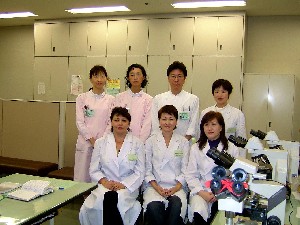Over the Years
Home > Over the Years > Over the Fiscal Years (2000 APR - 2010 MAR) > Kazakhstan: Medical Doctor Training Program
Kazakhstan: Medical Doctor Training Program
Name and Position:
Kulzhami Ospanova
Head of Cytology Department, Ust-kamenogorsk Oncology Center
Aliya Jaxalykova
Cytologist, Semipalatinsk Oncological Center
Period:
Host Organization:
Training Course:

Training Scene
Dr. Kulzhami Ospanova's Impressions:
I am pleased to have been able to receive special training regarding health care for radiation-exposed patients in Japan. I would like to thank both the Japanese people and government for my time in Hiroshima. If the Japanese government did not suggest the support plan for the Semipalatinsk region at the conference of the United Nations, we could surely not have received such support from around the world: in short, I could not have stayed in Hiroshima. Through the Japan International Cooperation Agency (JICA), the Japanese government provided us with reagents, microscope slides, and other medical equipment (such as the microscopes provided in October 2004).
I would also like to thank HICARE, chaired by Dr. Dohy and coordinated by Dr. Chikako Ito, and the Director of the Health Management Center of the Hiroshima Atomic Bomb Casualty Council. To everyone involved, I wish to extend my sincere appreciation for their support for Semipalatinsk region.
At the Atomic Bomb Casualty Council, we received both theoretical and practical training. First, we had a group preventative health examination program. Subsequently, we visited the pathological section to inspect the work of laboratory technicians, visited the CT room and the endocrinology section to inspect techniques, as well as observing techniques for sampling for gynecological examination.
I would like to thank Ms. Yumi Ohishi, Ms. Sumi Iwami, and Mr. Hirofumi Ashimen for serving as our direct advisors, as well as all the technicians we worked with at the General Examination Department of the Council. I also would like to thank Ms. Yamada for her fluent Russian interpretation, despite the immense difficulty of medical terminology. She presented me with numerous opportunities to get in touch with Japanese culture.
The training was quite fruitful training thanks to the many kind people of Hiroshima. Again, I would like to extend my deep appreciation for their warm assistance.
Dr. Aliya Jaxalykova's Impression:
I will remember my stay in Hiroshima as one of the most vivid and enjoyable experiences of my life. Thanks to the Japanese people and via this training program, I was able to learn new and significant medical techniques. I would like to thank for our wholehearted welcome Dr. Dohy, President of HICARE and Director of the Hiroshima Red Cross Hospital & Atomic-bomb Survivors Hospital, Dr. Ito, Director of the Hiroshima A- Bomb Casualty Council, and all the staff, for providing us with space at the laboratory and specialized training in high-level cytology.
In addition to Dr. Ito, I would like to thank Mr. Ashimen, Ms. Iwami and Ms.Ohishi, who helped us at the laboratory and created a wonderfully friendly environment. Thanks to Dr. Ito's arrangement, exchanging information with other medical specialists, we were able to inspect state-of-the-art medical equipment capable of handling heavy workloads. Via participation in the preventive medical check program, I learned in detail what is currently being practiced in Japan. I was also impressed with the lecture by Mr. Ashimen. In the lecture regarding practices for early detection of caner, I learned of methods for examining data on complicated diseases despite few samples. I also learned in detail about medical activities for A-bomb survivors: their general examinations and other medical services. Hearing Mr. Ashimen's cytological experience and technical expertise was significant for me, and the discussions of cytology were very productive.
I would also like to thank Ms. Yamada for her fluent Russian interpretation. She helped both in the field of our study and in our everyday lives, showing us the town and introducing us to many people in Hiroshima.
I would like to close by showing my deep appreciation to HICARE, for arranging our productive and fruitful training in Hiroshima.




